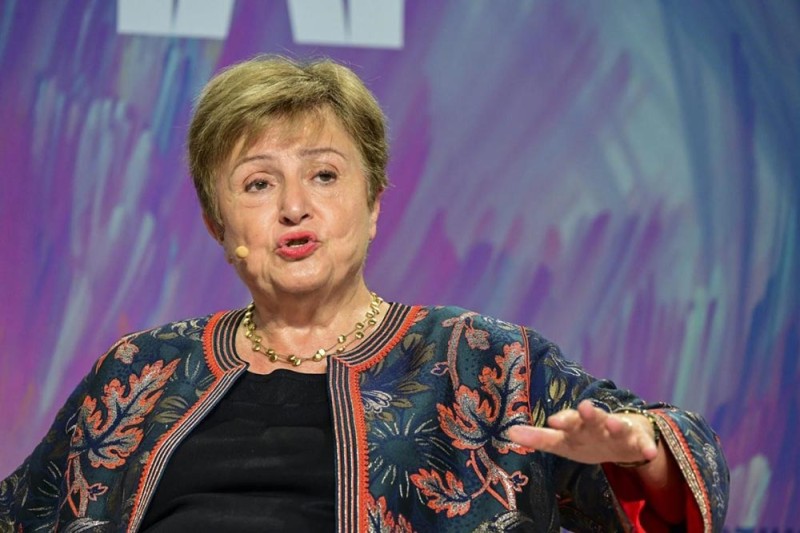
中美贸易冲突持续升级让投资者惴惴不安,担忧这可能标志着我们熟知的全球合作走向终结。上周五,唐纳德·特朗普总统称中国新出台的出口管制措施“极具攻击性”,并威胁将实施100%的报复性关税。(此后他试图缓和局势,安抚美国市场情绪。)
对国际货币基金组织(International Monetary Fund)总裁克里斯塔利娜·格奥尔基耶娃(Kristalina Georgieva)而言,这不过是工作日常。在华盛顿特区举行的《财富》2025年最具影响力商界女性峰会上,她如此看待对贸易战的担忧。
“坦率而言,所谓贸易已死的论调纯属夸大之词,”格奥尔基耶娃对《财富》记者黛安·布雷迪(Diane Brady)表示,“贸易如流水,遇阻自会绕行。”
尽管格奥尔基耶娃承认,世界正变得“愈发迷雾重重”且充满不确定性,但最大挑战之一在于让各方达成共识、认同合作远胜于分裂:“我们同处一艘巨轮,航行于惊涛骇浪之中,唯有齐心协力才能渡过难关。”
值得庆幸的是,许多国家已认同这一理念。她指出,今年早些时候美国加征关税后,国际货币基金组织191个成员国中有188个未采取报复措施,而是选择与区域合作伙伴开展贸易。东南亚和海湾地区便是典型例证。
即便是中国,亦从贸易多元化中获益:受与欧盟贸易强劲增长的推动,9月中国出口总额同比增长8.3%,创下今年新高。海关总署数据显示,当月中国对美出口下降27%,标志着对美贸易连续半年出现两位数下滑。
但格奥尔基耶娃补充道,对企业领袖而言,只要愿意“做好准备、迎接挑战”,就有机会成为稳定局势的中坚力量。
“这对世界而言无疑是个利好消息:私营部门更具灵活性、适应性更强,”她表示,“过去几年里,我们看到在许多存在强力政府干预的国家——包括那些因国际货币基金组织敦促而减少政府干预的国家——私营部门展现出更强的主动性。在逆风时期,企业领袖是稳定局势的锚点,因为你们能适应变化,始终稳步前行。”
她特别强调女性企业领袖需时刻预判最坏情形并做好应对准备。
“设想那些看似不可能发生的情况,方能在危机真正降临时从容应对,”格奥尔基耶娃表示,“新冠疫情和欧洲冲突已向我们证明,危机终将降临。而女性坚韧而强大,定能直面挑战。” (*)
译者:中慧言-王芳
中美贸易冲突持续升级让投资者惴惴不安,担忧这可能标志着我们熟知的全球合作走向终结。上周五,唐纳德·特朗普总统称中国新出台的出口管制措施“极具攻击性”,并威胁将实施100%的报复性关税。(此后他试图缓和局势,安抚美国市场情绪。)
对国际货币基金组织(International Monetary Fund)总裁克里斯塔利娜·格奥尔基耶娃(Kristalina Georgieva)而言,这不过是工作日常。在华盛顿特区举行的《财富》2025年最具影响力商界女性峰会上,她如此看待对贸易战的担忧。
“坦率而言,所谓贸易已死的论调纯属夸大之词,”格奥尔基耶娃对《财富》记者黛安·布雷迪(Diane Brady)表示,“贸易如流水,遇阻自会绕行。”
尽管格奥尔基耶娃承认,世界正变得“愈发迷雾重重”且充满不确定性,但最大挑战之一在于让各方达成共识、认同合作远胜于分裂:“我们同处一艘巨轮,航行于惊涛骇浪之中,唯有齐心协力才能渡过难关。”
值得庆幸的是,许多国家已认同这一理念。她指出,今年早些时候美国加征关税后,国际货币基金组织191个成员国中有188个未采取报复措施,而是选择与区域合作伙伴开展贸易。东南亚和海湾地区便是典型例证。
即便是中国,亦从贸易多元化中获益:受与欧盟贸易强劲增长的推动,9月中国出口总额同比增长8.3%,创下今年新高。海关总署数据显示,当月中国对美出口下降27%,标志着对美贸易连续半年出现两位数下滑。
但格奥尔基耶娃补充道,对企业领袖而言,只要愿意“做好准备、迎接挑战”,就有机会成为稳定局势的中坚力量。
“这对世界而言无疑是个利好消息:私营部门更具灵活性、适应性更强,”她表示,“过去几年里,我们看到在许多存在强力政府干预的国家——包括那些因国际货币基金组织敦促而减少政府干预的国家——私营部门展现出更强的主动性。在逆风时期,企业领袖是稳定局势的锚点,因为你们能适应变化,始终稳步前行。”
她特别强调女性企业领袖需时刻预判最坏情形并做好应对准备。
“设想那些看似不可能发生的情况,方能在危机真正降临时从容应对,”格奥尔基耶娃表示,“新冠疫情和欧洲冲突已向我们证明,危机终将降临。而女性坚韧而强大,定能直面挑战。” (*)
译者:中慧言-王芳
The escalating trade clash between the U.S. and China has investors on edge, fearing it could mark the beginning of the end for global cooperation as we know it. On Friday, President Donald Trump called China’s new export controls “extraordinarily aggressive” and “hostile”; he threatened a retaliatory 100% tariff. (He later sought to deescalate the situation, calming U.S. markets.)
For Kristalina Georgieva, head of the International Monetary Fund, it’s just another day in the office. Speaking at Fortune’s Most Powerful Women 2025 summit in Washington, D.C., she downplayed any fears of a trade war.
“Frankly, this thing that trade is dead is completely overstated,” Georgieva told Fortune’s Diane Brady. “Trade is like water. You put [up an] obstacle, it goes around it.”
And while Georgieva recognizes the world is becoming “foggier” and full of uncertainty, one of the biggest challenges comes from getting buy-in that cooperation is better than division: “We are in this one big boat. It is a rough sea. We better row together.”
Luckily, many countries already subscribe to this philosophy. She pointed out that following the onset of U.S. tariffs earlier this year, 188 out of the IMF’s 191 member states did not choose to retaliate. Instead, they’ve turned to regional partners for trade. Southeast Asia and the Gulf region are two examples she cited.
Even China has benefited from diversifying its trade portfolio: overall exports rose 8.3% in September—the highest total this year—thanks to strong trade growth with the European Union. Chinese shipments to the U.S. fell 27% in September, marking half a year of double-digit trade declines, according to data released by the General Administration of Customs.
But for business leaders, there’s a growing opportunity to be a grounding voice as long as they are willing to “buckle up,” Georgieva added.
“Good news for the world. The private sector is more agile, more adaptable,” she said. “Over the last years, we have seen in many countries where there was [a] big state presence in the economy—including because of IMF urging them to pull back—more private sector initiative. And in this time of strong winds, [business leaders] are an anchor of stability because you adapt, you just keep doing it.”
For female business leaders, in particular, she reiterated the need to always be thinking about worst case scenarios—and be ready to adapt to them.
“Think of the unthinkable so you’re ready when the unthinkable comes,” Georgieva said. “Because we know from COVID, we know from the war in Europe, it will come, and we women are so strong and resilient, and we can face it.”

